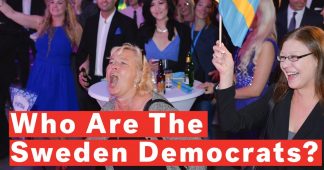29 March 2021
Photo: Henrik Montgomery/TT
The second smallest party in the Swedish parliament, the Liberals, is again dominating the headlines after it approved proposals to campaign for a centre-right government in next -year’s general election, opening the door to cooperation with the far-right Sweden Democrats.
The committee also voted that the party’s leadership can negotiate with the populist Sweden Democrats on policy, and even involve them in budget negotiations.
Why is that controversial?
The first part of the vote — campaigning alongside the Moderate Party and Christian Democrats — is in itself no surprise. The three parties have been allies through several election cycles as part of the right-wing Alliance, together with the Centre Party.
But the Alliance fell apart after the 2018 election, when neither they nor the centre-left bloc received enough votes to govern alone. A right-of-centre government would have relied on accepting support from the Sweden Democrats, a populist party with roots in neo-Nazi groups in the 1980s, which would likely only have been given in return for some level of policy influence.
The former leader of the Liberal Party, Jan Björklund, argued that the party’s values precluded negotiating with the Sweden Democrats, as did the Centre Party and its leader Annie Lööf.
Instead, the Liberals and Centre Party agreed not to vote against Social Democrat prime minister Stefan Löfven, allowing him to govern in exchange for policy influence as agreed in the so-called January Agreement between the four parties. This meant the centre-left government agreed to liberal policies such as cutting tax on the highest earners and reforming Sweden’s ‘first in first out’ labour laws.
The Liberal party remains deeply split on the issue of cooperating with the Sweden Democrats, with Christer Nylander, the second vice-chair of the party, who has been one of the staunchest opponents of ending the ‘cordon sanitaire’ around the Sweden Democrats, announcing after that vote that he would not put himself up for election in 2022. Sunday’s vote took place after several hours of debate, and several prominent figures in the party were staunchly against the proposals from leadership.
As the Liberal Party voted to cooperate with the Sweden Democrats this Sunday people are sharing this two-year-old tweet from the Liberals where they condemn the SD and the idea of working with it in very severe terms. https://t.co/soCMbbrDAi
— Loukas Christodoulou (@Loukas_RS) March 29, 2021
What limits does the new party policy set on deals with the Sweden Democrats?
The resolution which passed says that the budget propositions should “initially” be prepared by borgerliga, or ‘right-wing’ parties (which would exclude the Sweden Democrats).
The resolution also said that the party would not support “budget cooperation of the sort which took place between the parties in the January Agreement”, with any ytterkantsparti, or ‘outer-rim party’, which would include both the far-right Sweden Democrats as well as the far-left Left Party. However, a proposed formulation that closed the door entirely on budget cooperation with the Sweden Democrats was voted down.
To placate those uncomfortable with the new policy, the resolution, A New Start For Sweden, asserts that the Liberal Party’s mission was to go into “hard conflict with the present day’s illiberal ideas, no matter which party, from left or right, is promoting them”.
In her speech to the meeting, Sabuni reminded her party that she had battled racism throughout her career.
“I got involved in politics during a wave of xenophobia in the middle of the 1990s, when skinheads murdered refugees and the laser man was running around with a rifle,” she said. “For nearly 30 years, I’ve stood up against racism and for the liberal model of society.”
But the resolution also embodied the harder line on crime and on immigrant areas that Sabuni has brought to the party, promising to push for “a Sweden without parallel societies, where the criminal justice system is strong and no district is a free zone for criminals”.
How have other parties reacted?
The Sweden Democrats’ leader Jimmie Åkesson immediately cast doubt on whether the level of influence suggested in the Liberals’ resolution would be enough, saying neither he, nor his party, would be content to be a “support wheel for a government that doesn’t give us influence in proportion to our size”.
Åkesson has in the past suggested a written agreement that would look precisely like that agreed with the January parties.
Annie Lööf, the leader of the Centre Party — the other ‘January Party’ — was highly critical of the decision, writing on Facebook that she “regretted that the Liberals had chosen to open the door to an anti-liberal and xenophobic party”, hard words that double as an invitation to disgruntled Liberal voters.
What will the decision mean for The Liberal party?
The Liberal party were struggling in the polls even before Sabuni took over as leader in June 2019, but the party’s share of the vote has continued to fall, sometimes to under 3 percent, well below the 4 percent threshold needed to enter the Swedish parliament.
By winning the backing of the party’s controlling board, Sabuni has strengthened a weak position and beaten her internal critics, making it more likely that she will continue as leader up until the 2022 election.
The party can now expect to receive tactical votes from Moderate, Christian Democrat and even Sweden Democrat voters who want to push it above the four percent threshold, making it less likely that it will be ejected from parliament in the 2022 election.
At the same time, there is a risk that the party loses both MPs and voters who oppose cooperation with the Sweden Democrats.
What will the decision mean for Swedish politics?
The decision of one of the two liberal parties to agree to negotiate and cooperate with the Sweden Democrats is a significant milestone in the normalisation of the populist party, which was long a pariah no other party of left or right could be seen to negotiate with.
The Sweden Democrats’ leader Jimmie Åkesson has sought to make the party acceptable, both to mainstream voters and to other parties, promoting a zero-tolerance policy towards racist views, and seeking to attract Swedes with immigrant backgrounds as supporters, at the same time as pushing a hard line on immigration.
The Liberals’ decision may make it easier for liberal-minded Moderate supporters to accept their party’s decision to cooperate with the populist.
It seems unlikely, however, that it will win many more votes for the right-wing bloc. Any new voters the Liberals gain are likely to come from other right-wing parties, while the Liberal voters who oppose the decision may instead vote for the Centre Party, Green Party, or Social Democrats.
Published at www.thelocal.se











